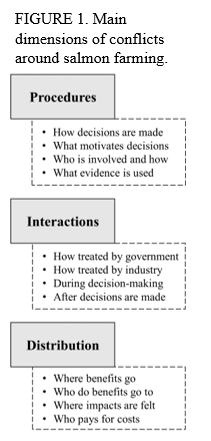CONCERNS, CONFLICTS AND CONTROVERSY: UNDERSTANDING DRIVERS OF OPINION AND OPPOSITION TO SALMON FARMING IN NOVA SCOTIA, CANADA
Salmon aquaculture is a publicly controversial issue i n Canada, with strong opposition being mobilized by certain groups such as environmental NGOs, fishing groups, and residents. Recently, social aspects are increasingly being recognized as important for more sustainable aquaculture management, fostering public trust and creating a positive environment for growth of the industry. The present study was conducted to better understand the motivations of opposition and identify factors influencing societal attitudes to salmon farming, using Nova Scotia as a case study.
This work is supported by two approaches. First, an online public survey aimed to capture views and opinions of 495 N ova Scotians towards salmon farming. Rural and urban respondents were significantly different in their perceptions and opinions of aquaculture, highlighting the need to incorporate both perspectives in understanding conflicts and fostering acceptance. Statistical m odels identified five major drivers best predicting negative views of aquaculture, including: age, environmental value system , salmon consumption patterns, trust in government, and perception of risks. Aquaculture k nowledge and exposure had little influence on opinion but may still help people who are undecided make decisions .
Second, interviews with diverse representatives within three salmon-farming communities in Nova Scotia provided a comparative analysis of how locals have experienced aquaculture and identifies common dimensions of conflict and controversy.
Three main dimensions emerge from conflict with both industry and government and include aspects regarding decision-making procedures, interactions, and distribution of outcomes (Figure 1).
As a result, social acceptance of salmon aquaculture is highly tied to public trust and concerns over how industry is managed.
Drawing from this work, we find that opposition does not represent a uniformed set of experiences, concerns, or conflicts. S ocial concerns revolve not only around material (e.g., economic) well-being, but highlight the specific importance of relational well-being, being the relationships with family, community, and their environment. Still, f indings reveal that opinion is nuanced across demographic and geographic contexts. Responding to opposition will require understanding variability in perceptions and considering the underlying personal, social, and geographic contexts in which they are embedded.
